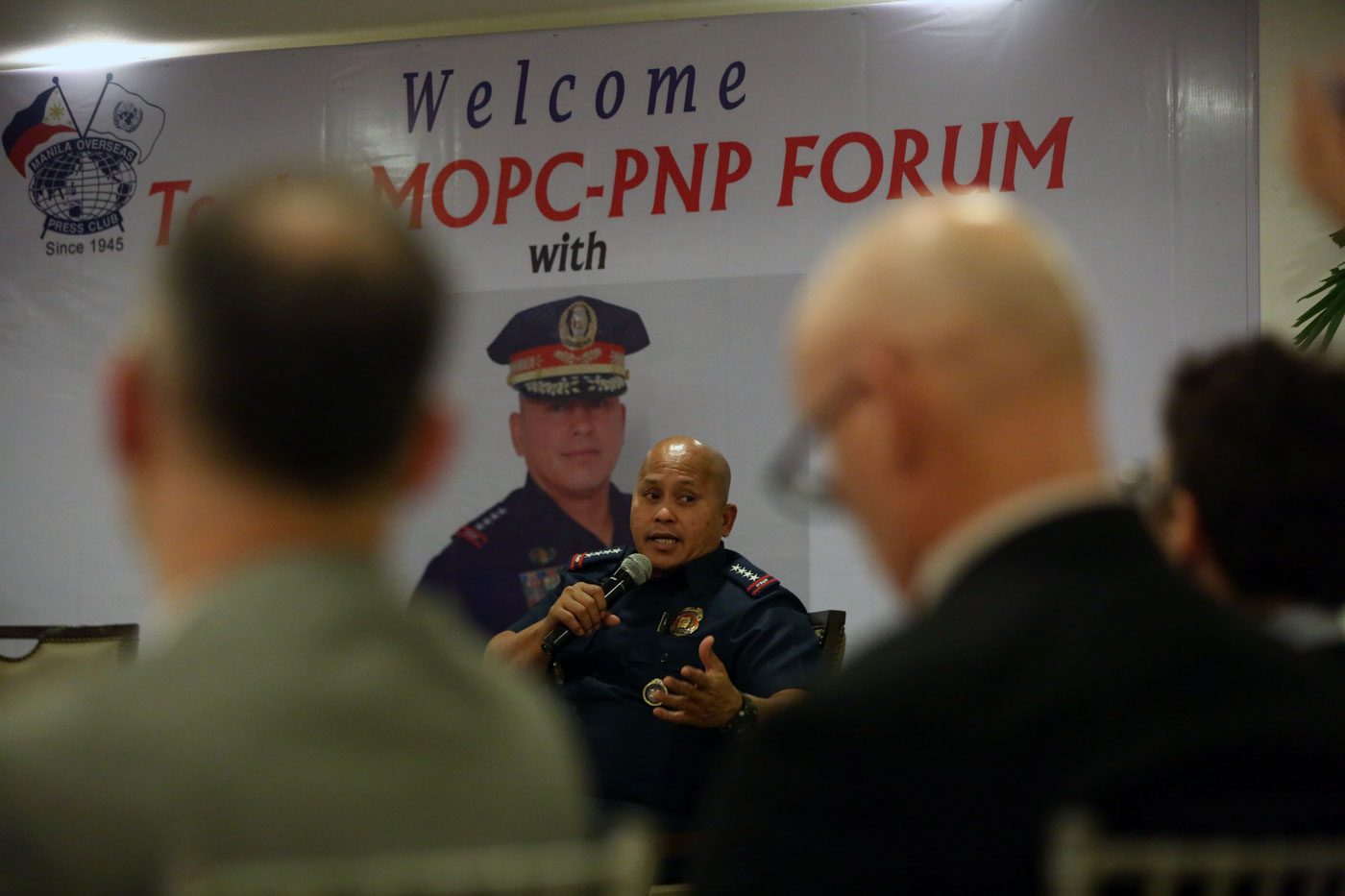SUMMARY
This is AI generated summarization, which may have errors. For context, always refer to the full article.

MANILA, Philippines – Amid the reported disruption of the Philippine National Police (PNP)’s plan to purchase assault rifles from the United States, its chief, Director General Ronald dela Rosa lashed out at “biased media outlets” that supposedly only show one side of the country’s war on drugs.
“Kung makiusap ako sa kanila [US senators criticizing the PNP], para tayong magmamakaawa sa kanila. Pakiusap ko sa kanila please verify properly your reports. Kung gusto ‘nyo kayo mismo ‘yung pumunta dito, feel it for yourselves anong nangyayari dito. ‘Wag lang po kayong basta-bastang tumanggap ng mga reports from biased media outlets. ‘Yun ang aking advice sa kanila,” Dela Rosa said on Wednesday, November 2, during a press conference in Camp Crame.
(If I appeal to [US senators criticizing the PNP], it’ll be like we’re begging them. But I ask them to please verify properly your reports. If you want, you can come here yourself and feel what’s happening here. Don’t just accept reports from biased media outlets. That’s my only advice to them.)
Dela Rosa was reacting to news that the US State Department, according to a Reuters report, stopped the planned sale of more than 27,000 assault rifles worth over P1.7 billion because a US senator “was reluctant for the United States to provide the weapons given concerns about human rights violations in the Philippines.”
In the US, the State Department informs Congress of international weapons sales. Reuters said the Senate Foreign Relations committee staff informed the State Department of Senator Ben Cardin’s plan to oppose the deal during the prenotification process for the sale of the assault rifles.
Dela Rosa added: “Prankahan tayo, merong mga biased, hindi lang sa local, pati sa international media outlets, ang nakikita lang nila ‘yung masamang nangyayari. ‘Yung kabutihan na nangyayari sa ‘Pinas na dulot sa nangyari sa war on drugs hindi po nila ‘binabalita, ang ‘binabalita lang nila kung ano ‘yung masama, kahit ‘yung maliit na masamang makita nila, pinapalaki nila. ‘Yung napakalaking kabutihan ngayon, hindi nila ‘pinapakita. That’s how biased these people are.”
(Let’s be honest. There are biased – not just local but also international media outlets – that only see the bad things that are happening. The good things happening because of the war on drugs, they don’t report it. They only report the bad things. The little bad that happens, they amplify it. But the good that’s happening, they don’t show it. That’s how biased these people are.)
It’s not the first time Dela Rosa – or any other supporter of the Duterte administration – has criticized media for supposedly being biased in its reportage on the Philippine government and its programs.
In September and October this year, the National Union of Journalists of the Philippines called on the Palace to investigate social media attacks against freelance journalists and two Manila-based reporters of Reuters by some of the President’s more die-hard supporters.
Duterte, in return, called on them not to threaten journalists.
Stalled procurement
The procurement of 27,395 basic assault rifles is part of the government’s 2010-2015 Capability Enhancement Program for the PNP. The P1.7-billion contract, according to Dela Rosa, was signed in July 2016 between the PNP and US-based SigSauer and Intrade Asia Pacific Corporation.
The SIG M400 are expected to be delivered by early 2017.
Despite media reports of the deal’s halting, Dela Rosa, quoting a letter from Intrade Asia Pacific Corporation, said the State Department was still processing the export license for the firearms.
“The procurement of these rifles will increase the percentage fill-up for long firearms from 35% to 86% thus enhancing the firepower capability of Public Safety Forces and other PNP units involved in the campaign against terrorism, a serious threat to global peace and security,” said Dela Rosa in a prepared statement.
The rifles are meant to be issued to the PNP’s public safety forces, municipal and police stations, and other national support units.
On Wednesday, Dela Rosa downplayed the impact of the apparent halting of the procurement deal.
“It’s their loss, not ours. If they don’t want to sell to us, there are other manufacturers that can supply us the firearms. There’s Germany, there’s Israel, there’s Belgium, there’s Russia and China. So we have a lot of options,” he said.
Yet, last Tuesday, Dela Rosa expressed concern over the reported failed sale, saying it would have a huge impact on the police force. He said then that he would ask President Rodrigo Duterte to allow him to talk to the foreign affairs department to address the issue. (READ: Dela Rosa wants DFA help after US halts rifle sale)
Dela Rosa, however, admitted should the deal be halted, the “time lost” would be his biggest regret. Procurements in the Philippines take time since bids must be opened to the public before they are eventually screened.
This isn’t the first hiccup in the PNP’s links to the US. In October, the San Francisco Police Department announced it would be stopping a long-running training program with the PNP because of concerns over supposed human rights violations. – Rappler.com
Add a comment
How does this make you feel?
There are no comments yet. Add your comment to start the conversation.